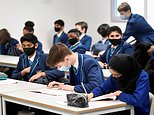School staff absences could force a fresh return to online lessons
New fears for face to face teaching: School staff absences could force a fresh return to online lessons as masks make a classroom comeback
Nadhim Zahawi said schools might find face-to-face teaching impossibleOmicron variant could lead to mass staff shortages and teacher absencesHis admission came as Department for Education confirmed secondary school pupils will have to wear masks in classrooms and test twice a week
<!–
<!–
<!–<!–
<!–
(function (src, d, tag){
var s = d.createElement(tag), prev = d.getElementsByTagName(tag)[0];
s.src = src;
prev.parentNode.insertBefore(s, prev);
}(“https://www.dailymail.co.uk/static/gunther/1.17.0/async_bundle–.js”, document, “script”));
<!–
DM.loadCSS(“https://www.dailymail.co.uk/static/gunther/gunther-2159/video_bundle–.css”);
<!–
Entire classes may need to be merged into larger groups or sent home to work remotely due to teacher absences caused by coronavirus, the Education Secretary said yesterday.
Schools may find it ‘impossible’ to deliver face-to-face teaching to all pupils as the Omicron variant leads to mass staff shortages, Nadhim Zahawi added.
His admission came as the Department for Education confirmed that secondary school pupils will have to wear masks in classrooms and test themselves twice a week when they return tomorrow.
In an open letter to schools sent yesterday, Mr Zahawi said remote learning ‘should only be on a short-term measure’ and schools ‘should return to full-time in-person attendance for all pupils as soon as practicable’.
He added: ‘If operational challenges caused by workforce shortages in your setting make delivery of face-to-face teaching impossible, I would encourage you to consider ways to implement a flexible approach to learning.’
This could involve using all available staff to ‘maximise on-site education for as many pupils as possible’ while schools ‘flexibly deliver provision either on-site or remotely to some pupils’. However, he stressed that such arrangements must be only temporary.
Schools may find it ‘impossible’ to deliver face-to-face teaching to all pupils as the Omicron variant leads to mass staff shortages, Nadhim Zahawi (pictured) said
He added: ‘If operational challenges caused by workforce shortages in your setting make delivery of face-to-face teaching impossible, I would encourage you to consider ways to implement a flexible approach to learning.’
This could involve using all available staff to ‘maximise on-site education for as many pupils as possible’ while schools ‘flexibly deliver provision either on-site or remotely to some pupils’. However, he stressed that such arrangements must be only temporary.
Short of sending children home to learn remotely, other options include bringing in supply staff and combining classes into larger groups.
Less than 3 per cent of teachers were recorded as being off sick at the start of last month. But worries are growing that numbers could rise sharply – with one of Britain’s largest academy trusts saying it had experienced staff absence levels of 10 per cent.
And unions have predicted some form of disruption ‘looks sadly inevitable’ as the new term starts.
The Government has faced mounting criticism over its decision to reintroduce face masks, with critics saying it a ‘declaration of war against children’ (file image)
The Government has faced mounting criticism over its decision to reintroduce face masks, with critics saying it a ‘declaration of war against children’.
However teachers and unions have broadly welcomed the move, stressing that it is preferable to remote learning.
In August 2020, Boris Johnson called the notion of wearing masks in classrooms ‘nonsensical’. But the recommendation was brought in for two months last March and will again be in place from the start of the coming term until at least January 26.
Geoff Barton, general secretary of the Association of School and College Leaders, said: ‘Face coverings are already advised in communal areas for pupils in year 7 and above.
‘Pupils are accustomed to their use and we are sure the reintroduction of face coverings in classrooms is something that schools and colleges will take in their stride.’
Dr Mary Bousted, joint general secretary of the National Education Union (NEU), said masks were unlikely to have a ‘significant mental health effect’ on pupils.
She added: ‘We have mask-wearing in secondary schools in Wales and Scotland, and I don’t think that it is causing a huge problem.’ And Rev Steve Chalke, the founder of academy trust Oasis Community Learning, said that while enforcing masks in classrooms was ‘not optimum’, it was ‘better than working at home’.
Pictured: The number of Covid infections in the UK yesterday
He told Sky News: ‘We can’t afford lost days of schooling for these children and we know from reports in the media that children being left on their own is not good for them, it’s not good for society.’
However, Tory MP Robert Halfon, chairman of the Commons education committee, told Sky News he wanted the Government to ‘set out the evidence’ in the Commons to justify the decision.
‘If masks are not required in offices or restaurants, why are we getting young kids to put them on?’ he said.
And Us For Them, a parents’ group which has campaigned against schools being closed during the pandemic, said it was ‘dumbfounded’ by the decision.
‘Kids’ faces should never be used as political pawns. This is a declaration of war against children’, the group added.
Some 7,000 air cleaning units will also be provided to schools, colleges and early-years settings to improve air quality, it was announced. And staff and pupils have been urged to self-test at home before they return and start testing twice-weekly at school.
The Department for Education said schools and colleges can obtain tests through a separate supply route and ‘will have access to more as needed’.
A Government spokesman said masks and other measures will ‘maximise the number of children in school’ for the ‘maximum amount of time’.
Pictured: The number of Covid hospitalisations in London up until December 31
![]()


